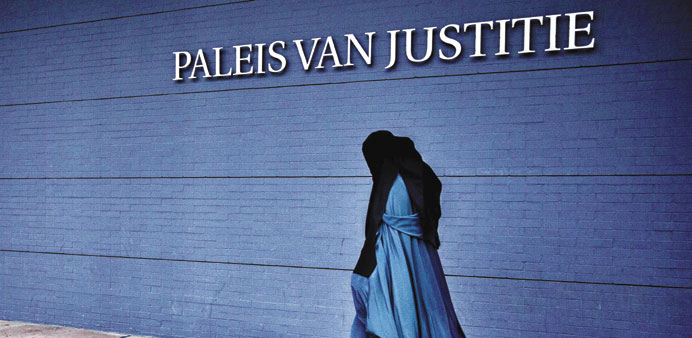This file picture shows a woman in a burqa walking past the Palace of Justice in The Hague. The Dutch cabinet has approved a partial ban on wearing the face-covering veil, including in schools, hospitals and on public transport.
Reuters/AFP/The Hague
The Dutch government has agreed to introduce a partial ban on the wearing of the full-face veil in public places, the home affairs ministry said in a statement.
The proposed ban must be approved by parliament before it can become law.
“Face-covering clothing will in future not be accepted in education and healthcare institutions, government buildings and on public transport,” the government said in a statement after the cabinet backed Interior Minister Ronald Plasterk’s bill.
The ban does not apply to wearing the burqa on the street, but only “in specific situations where it is essential for people to be seen” or for security reasons, Prime Minister Mark Rutte told journalists after the cabinet meeting.
The ban would apply to all face-covering clothing, including ski-masks and helmets.
The measure “had nothing to do with religion”, Rutte stressed.
“In a free country like the Netherlands, everyone has the right to dress how they choose, no matter what others think. That freedom is only limited in situations when it is essential for people to look at each other,” the statement said.
The government said it had “tried to find a balance between people’s freedom to wear the clothes they want and the importance of mutual and recognisable communication”.
A previous bill banning the burqa even on the street and dating from Rutte’s last government, which was supported by anti-Islam populist Geert Wilders, will be withdrawn.
The government said that it “sees no reason for a general ban that would apply to all public places”.
It was agreed that a new bill would be drawn up by the coalition partners of Rutte’s Liberal VVD party and the Labour PvdA when they formed their coalition in 2012.
Those flouting the ban can be fined up to €405 (around $450).
Wilders told Dutch television yesterday that the proposed measure was “weak”.
Only a few hundred women in the Netherlands veil themselves completely, but Rutte said such laws were needed to “enforce values” of Dutch society.
France banned full-face veils in 2010, in a move that was upheld last year by the European Court of Human Rights.

